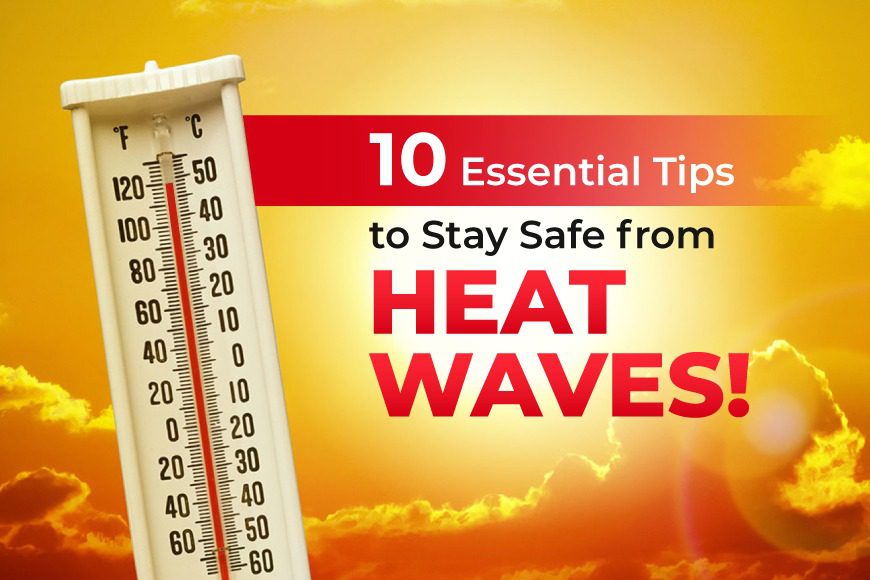During summer’s never-ending heat, Haven’t you noticed that yearly average temperatures rise, intensifying the force of heat waves? Well, the twist is, despite their appearance as merely another seasonal annoyance, heat waves actually have more going on. It may surprise you that heat waves are more lethal than tornadoes, hurricanes, or floods. It’s unexpected, isn’t it? In addition to learning these crucial pointers, we’ll also learn some fascinating details that clarify the actual effects of heat waves and the reasons they require our attention.
There are serious risks to our health and well-being associated with these extended hot spells, thus we must take preventative action to stay safe. We’ll go over ten crucial suggestions in this blog to help you combat the heat and keep safe when heat waves get stronger.
The Growing Threat
Heat waves are becoming a serious threat to public health. Recent figures show that heat waves have increased in frequency, duration, and intensity over the past few decades. Since the 1960s, the frequency of heat waves doubled, having a major impact on human health. In India over 25,000 people are hospitalized due to heat stroke. Heat-related illnesses are becoming more common, resulting in hospital stays and even deaths from these conditions. It is more crucial than ever to be ready for the heat as extreme weather events are made worse by climate change.
H: Hydrate
Staying hydrated is one of the most important things you can do to keep yourself safe during a heat wave. When temperatures rise sharply, dehydration can quickly set in and cause weariness, lightheadedness, and even heatstroke. Even if you don’t feel thirsty, make it a point to drink a lot of water throughout the day. To make sure you stay hydrated when on the run, try to consume eight glasses of water or more each day and think about always having a reusable water bottle with you.
E: Escape the Sun
When the sun is shining brightly, seeking cover from its powerful rays becomes even more important. Whenever feasible, seek cover indoors in air-conditioned areas, particularly during the warmest hours of the day, which are usually between 10 a.m. and 4 p.m. If you must be outside, make an effort to remain in places with plenty of shade, like parks, or find other ways to produce your shade with hats and umbrellas. Remember that extended exposure to direct sunlight raises your chance of developing heat-related conditions including sunburn.
A: Avoid Intense Activity
It’s crucial to pay attention to your body during heat waves and stay away from physically demanding activities, especially outside. The body’s capacity to control its temperature can be strained by high temperatures, which raises the risk of heat exhaustion and heatstroke. If exercising is necessary, think about doing it early when it’s cooler, like in the morning or late at night. As an alternative, choose indoor activities like swimming or yoga to keep cool while being active.
T: Track Temperature
During heat waves, it’s important to be aware of the local temperature and heat index. Pay attention to heat advisories and weather predictions, since they might offer important details about impending heat waves and other extreme heat-related occurrences. To keep track of the most recent temperature updates and adjust your plans accordingly, use weather applications or websites. You can take preventative measures to keep safe and stay away from heat-related ailments by being mindful of the temperature.
W: Wear sunscreen
It’s critical to protect your skin from the sun’s damaging UV rays, particularly during heat waves when sun exposure lasts for a longer time. Put sunscreen with a high SPF(more than SPF 30) on your face, neck, arms, and legs, as well as any other exposed skin areas. Reapply sunscreen every two hours, especially if you’re sweating or swimming.
A: Avoid overexertion
To avoid overexertion and heat-related ailments, you must keep a slow pace during heat waves. Pay attention to your body’s cues and stop when necessary, particularly if you begin to feel lightheaded, faint, or exhausted. To assist your body adjust to the heat, prioritize rest and try not to push yourself too hard, especially in hot and muggy weather.
V: Ventilate
It’s crucial to have adequate ventilation to keep the body temperature at a comfortable level during heat waves. To encourage ventilation and lower interior temperatures, use fans, air conditioners, or open windows. Open the windows on the opposing sides of your house to let cool air in and hot air out, creating cross-ventilation. To keep your house cooler throughout the day and block out direct sunshine, consider installing window coverings or shades.
E: Eat less
It can be more difficult to stay cool during heat waves if you consume a heavy lunch because it increases your body’s metabolic heat output. Choose lighter, easier-to-digest foods like fruits, vegetables, salads, and cold soups in place of hearty, filling dinners. These foods can give you vital nutrients and help you stay hydrated without making you feel too hot. Steer clear of hefty meals high in protein and spicy foods, which might cause you to become uncomfortable in the heat by raising your body temperature.
In conclusion
It’s critical to take preventative measures to shield oneself from the risks of heat waves when temperatures rise. You may reduce your risk of heat-related illnesses and stay safe and comfortable during periods of excessive heat by adhering to these ten crucial measures. Always prioritize being hydrated, look for shade, and refrain from physically demanding activities. You can overcome the heat and have a safe and fun summer with a little planning and knowledge. Remain calm, remain hydrated, and be careful!

